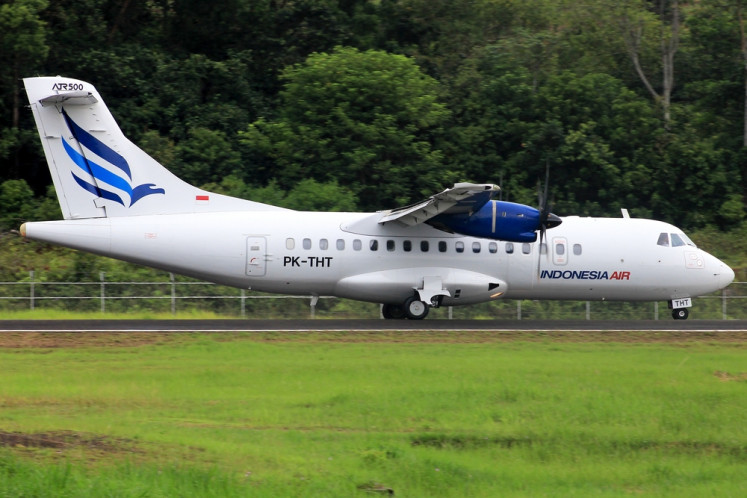Popular Reads
Top Results
Can't find what you're looking for?
View all search resultsPopular Reads
Top Results
Can't find what you're looking for?
View all search resultsExotic poultry breeds steal limelight in flora and fauna expo
Pretty birds: A visitor to the annual flora and fauna expo looks at various exotic chicken breeds at one of the expo's booths on Tuesday
Change text size
Gift Premium Articles
to Anyone
Pretty birds: A visitor to the annual flora and fauna expo looks at various exotic chicken breeds at one of the expo's booths on Tuesday. The expo is being held at Lapangan Banteng, Central Jakarta, until Oct. 6.(JP/Nina Loasana)
Dozens of rare breeds of poultry of various sizes and looks are the major attraction at the annual flora and fauna expo at Banteng Square in Central Jakarta where they spark the curiosity of visitors.
In the exhibition that opened last Friday and is to last until Oct. 6, visitors cannot see animals typically found in mass breeding farms or poultry markets in various parts of the capital city.
However, there are three booths exhibiting and selling rare poultry breeds. One of them belongs to Erik Nugroho. Apart from the exotic poultry, Erik’s booth also exhibits iguanas, turtles, boa snakes, sugar gliders, love birds, hedgehogs, cats and rabbits.
Of all those exotic animals on display, the show stealer in his booth is a flock of chickens of a breed from Poland, fittingly called polish chickens. The chickens are known for their remarkable helmet-like crest that nearly covers the entirety of their heads.
“The polish chicken is the most popular chicken breed in my shop. People think they’re cute as they look like they’re wearing helmets,” Erik told The Jakarta Post on Tuesday.
Besides the polish breeds, other stars in Erik’s booth are a number of small-legged chickens known as ayam kate (bantam chickens). They are considerably the smallest breed in the chicken family, about one-fifth or one-quarter the size of standard chickens.
“The bantam is popular among Indonesians because there are a lot of contests held for this specific chicken breed. Another popular chicken breed for contests is the serama chicken from Malaysia which is often dubbed as 'the proud chicken' because the breed has a very puffed chest,” he explained.
Erik’s booth also exhibits and sells turkeys, domestic Guinea fowls, pearl hens from Africa, which have pearl-like patterns in their feathers, and silkies from the Netherlands, which have black skin and are known for their silky and fluffy plumage.
The exotic and unusual poultry breeds in Erik’s outlet come with quite a hefty price, costing from 10 to more than 100 times the price of regular ones.
Erik explained that a pair of male and female Poland chickens cost Rp 550,000 (US$35.50), while pearl hens cost Rp 600,000 a pair, silkies Rp 400,000 a pair, turkeys Rp 500,000 a pair and a pair of bantams cost Rp 300,000.
The two most expensive poultry breeds in Erik’s stall, however, are the golden pheasant from China and the brahma chicken from the United States. The golden pheasant is a bird with striking colors, a mix of gold, orange, yellow, green, blue and red, which costs Rp 1.5 million a pair. Meanwhile, the brahma chicken is one of the largest chicken breeds, famous for having feathered legs and feet and profuse fluffy feathering. The brahmas could cost Rp 1.2 million a pair, Erik said.
Three to six customers visit Erik’s booth every weekday and the number rises to 15 on weekends. In average, he could earn about Rp 15 million during the month-long expo.
Just a few meters to the right of Erik’s outlet, there is another booth of rare chicken breeds owned by Nurhadi from Ponorogo, East Java.
Similar to Erik, Nurhadi also sells popular poultry breeds like the polish, brahma, and bantam chickens.
However, unlike in Erik’s booth, two native chicken breeds are star performers in Nurhadi’s stall. They are the ayam ketawa (laughing chicken) from Sulawesi and ayam cemani (cemani chicken) from Java.
The ayam ketawa is prized for the clarity and unusual length of its crows, which are uncannily similar to a human laugh. Meanwhile, the cemani chicken is one of the rarest chicken breeds in the world and is famous for having entirely black feathers, beaks, tongues, skin, combs, meat, bones and internal organs.
“Cemani is one of the most popular chicken breeds in my shop,” Nurhadi told the Post on Tuesday. “A lot of people keep them as pets or use them for mystical rituals.”
A pair of small Cemani chickens is sold for Rp 700,000 and could go as high as Rp 5 million depending on their sizes and shapes. Meanwhile, ayam ketawa cost Rp 1.5 million each or more depending on the length of their crows.
This is Nurhadi’s fourth year exhibiting and selling poultry in the annual expo. On average, he could make deals with about 100 customers during an expo.
A visitor named Adam, who said he started collecting various chicken breeds when he was in junior high school, said he fell in love with their unusual characteristics.
He said he collected various chicken breeds like serama, ayam ketawa, golden pheasant and onagadori chicken, which could have exceptionally long tails of up to six meters.
“I love their unique characteristics,” he said.
“The onagadori was supposedly the pet of the Japanese emperor and has been locally bred after the emperor gave one to the first Indonesian president, Sukarno,” he explained.
Unlike regular chicken breeds, extra care is needed for these rare breeds, in particular the good-looking ones.
“It’s relatively easy to take care of attractive chicken breeds. However, just like any other pets, if you want them to grow big, healthy and have beautiful, shiny feathers, you need to make extra effort, like giving them vaccines, vitamins and other supplements, and in what and when to feed them,” Adam said. (nal)










